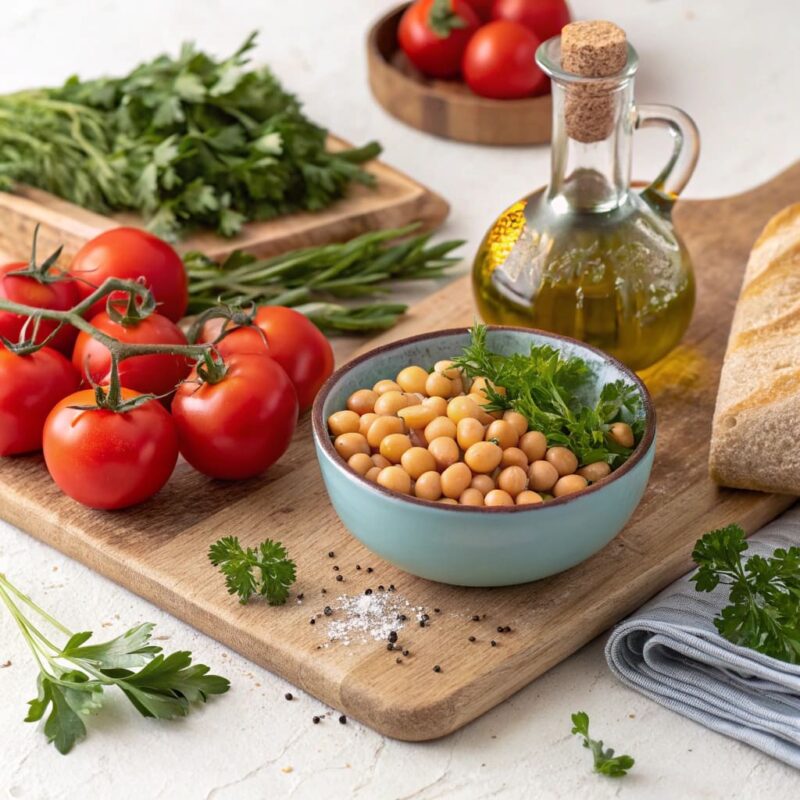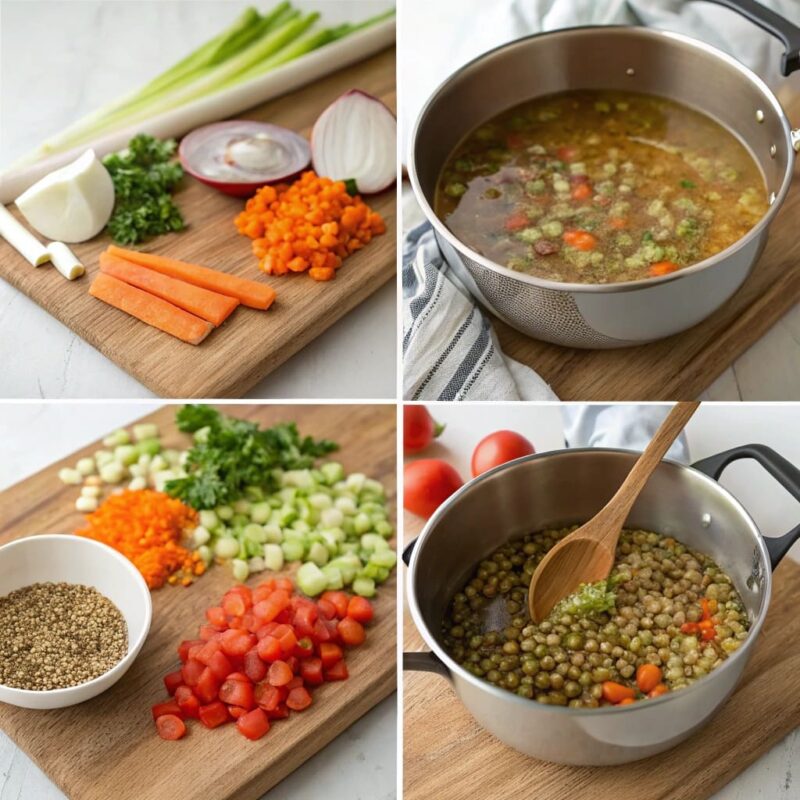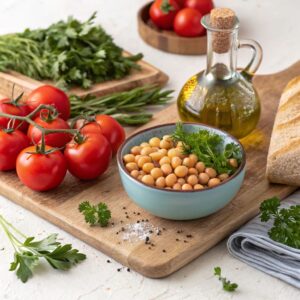When it comes to healthy eating, few cuisines rival the nutritional powerhouse of the Mediterranean diet. Packed with fresh vegetables, heart-healthy olive oil, and robust flavors, Mediterranean diet soup recipes offer a perfect combination of comfort and wellness. From hearty lentil soups to creamy Avgolemono, these dishes are as versatile as they are satisfying. If you’re ready to dive into a world of wholesome comfort foods, let’s explore everything you need to know about Mediterranean diet soups.

What Defines a Mediterranean Diet Soup?
A Mediterranean diet soup is more than just a bowl of broth and vegetables—it’s a celebration of natural, nutrient-dense ingredients. These soups typically feature staples of the Mediterranean pantry, such as legumes, fresh herbs, and olive oil. Moreover, they emphasize seasonal produce, plant-based proteins, and sometimes lean meats like chicken or fish.
Key characteristics include:
- Simple and fresh ingredients: Mediterranean soups avoid processed additives.
- Balanced nutrition: They emphasize whole foods that nourish the body.
- Flavorful seasonings: Herbs like thyme, oregano, and parsley play a starring role.
The Importance of Soups in Mediterranean Cuisine
In Mediterranean cultures, soups are not just appetizers—they’re often a centerpiece of the meal. They showcase the region’s resourcefulness, turning humble ingredients into culinary masterpieces. Soups are also deeply tied to traditions, whether it’s a hearty minestrone in Italy or a zesty chickpea stew in Morocco. Beyond their flavor, soups contribute to a balanced diet, providing essential nutrients without being heavy on calories.
Benefits of Mediterranean Diet Soup in Everyday Meals
Soups as Nutrient-Dense Meals
Soups in the Mediterranean diet combine fiber-rich vegetables, protein-packed legumes, and healthy fats like olive oil—all of which are key components of a balanced meal. For instance, whether you’re savoring a lentil soup or a white bean broth, these dishes deliver vitamins, minerals, and antioxidants in every spoonful.
Health benefits of Mediterranean soups include:
- Heart health: Thanks to olive oil and legumes, these soups support cardiovascular health.
- Immune boost: Garlic, onions, and leafy greens are loaded with immune-strengthening properties.
- Sustained energy: The combination of protein, fiber, and healthy fats keeps you full longer.
Explore the nutritional powerhouse of Mediterranean White Bean Soup for an example of how simple ingredients create bold flavors.
Hydration and Digestion Benefits of Liquid-Based Meals
Soups are an excellent way to stay hydrated while enjoying a satisfying meal. With their high water content, they contribute to your daily fluid intake and help maintain electrolyte balance. Additionally, the liquid base aids digestion, allowing your body to absorb nutrients more effectively. Broths simmered with herbs and vegetables are also known for their soothing effects on the digestive system, making Mediterranean soups ideal for gut health.
Key Ingredients in Mediterranean Diet Soup
Vegetables: A Rainbow of Nutrition
Vegetables form the backbone of Mediterranean soups. From bright tomatoes and zucchini to earthy carrots and kale, the emphasis is on using fresh, colorful produce. These vegetables not only provide essential vitamins but also add layers of flavor and texture to the soup.
Some popular vegetables include:
- Tomatoes: Rich in lycopene, a powerful antioxidant.
- Spinach and kale: High in iron and vitamin K.
- Eggplants and zucchini: Low-calorie options for a hearty base.
Beans and Legumes: Lentils, White Beans, and Chickpeas
Beans and legumes are a cornerstone of Mediterranean cuisine, bringing plant-based protein and fiber to every recipe. Whether it’s creamy white beans or nutty chickpeas, these ingredients make soups more filling and nutritious.
- Lentils: A favorite for soups, offering protein, iron, and folate.
- Chickpeas: Packed with fiber, they add a slightly nutty flavor to broths.
- White beans: Their creamy texture makes them a staple for hearty recipes.
Olive Oil and Herbs: The Mediterranean Signature
No Mediterranean soup is complete without a drizzle of extra virgin olive oil and a handful of fresh herbs. Olive oil, rich in monounsaturated fats, adds a velvety richness to the broth while amplifying its nutritional value.
Popular herbs and seasonings:
- Oregano: Brings an earthy, aromatic flavor.
- Basil: A sweet, peppery herb perfect for tomato-based soups.
- Parsley and dill: For a fresh and slightly tangy finish.
Are Lentils Good for a Mediterranean Diet?
Nutritional Profile of Lentils
Lentils are a Mediterranean diet superstar. These tiny legumes are packed with essential nutrients, including protein, fiber, and complex carbohydrates. Just one cup of cooked lentils provides:
- 18 grams of protein: Ideal for plant-based eaters.
- 15 grams of fiber: Supports digestion and promotes satiety.
- Rich in iron, folate, and magnesium: Vital for energy and overall health.
How Lentils Fit Perfectly in Mediterranean Recipes
Lentils are incredibly versatile and adapt well to the Mediterranean diet’s principles of simplicity and balance. They absorb the flavors of herbs, spices, and broths beautifully, making them ideal for soups. Common Mediterranean lentil dishes include hearty stews, creamy soups, and even salads paired with olive oil and lemon juice.
Benefits of Lentils for Weight Loss and Heart Health
Lentils are a weight-loss-friendly ingredient due to their high protein and fiber content, which keeps you full longer and reduces the temptation to snack. Additionally, their low glycemic index helps regulate blood sugar levels, making them a great choice for people with diabetes. For heart health, lentils’ ability to lower cholesterol and blood pressure earns them a top spot in the Mediterranean diet.
Can You Have Chicken Broth on the Mediterranean Diet?
What Types of Broths Are Acceptable?
The Mediterranean diet emphasizes natural, minimally processed ingredients, and chicken broth can be a part of it—provided it’s made with wholesome, clean components. When choosing or making chicken broth, avoid store-bought options loaded with preservatives, excess sodium, and artificial flavors. Opt for homemade or organic broths to stay aligned with the diet’s principles.
Acceptable broths for the Mediterranean diet include:
- Homemade chicken broth: Made with high-quality chicken, herbs, and vegetables.
- Low-sodium organic chicken broth: A store-bought option without additives.
- Vegetable or bone broth: Suitable alternatives for flavor and nutrients.
Alternatives to Chicken Broth (Vegetable Broth, Bone Broth)
For those who prefer plant-based options, vegetable broth is an excellent substitute. It’s easy to prepare by simmering onions, celery, carrots, and herbs. Bone broth is another nutrient-rich option, providing collagen and minerals, and it fits well with the Mediterranean diet when sourced from grass-fed or pasture-raised animals.
Tips for Making Mediterranean-Approved Chicken Broth
Homemade chicken broth is the gold standard for Mediterranean recipes. Follow these tips to ensure it aligns with Mediterranean principles:
- Use high-quality chicken: Opt for free-range or organic chicken for better flavor and nutrition.
- Incorporate Mediterranean flavors: Add herbs like thyme, oregano, and parsley, along with garlic and onions.
- Skim the fat: Remove excess fat to keep the broth light and heart-healthy.
- Simmer with vegetables: Add carrots, celery, and leeks for depth of flavor.
What Soups Are Part of the Mediterranean Diet?
Popular Mediterranean Soups and Their Ingredients
Mediterranean soups reflect the diversity of the region, using local ingredients and seasonings to create unique flavors. Here are some classic examples:
- Minestrone: A hearty Italian soup made with beans, vegetables, and pasta or rice.
- Greek Avgolemono: A tangy, creamy soup made with eggs, lemon, and chicken broth.
- Lentil Soup: A staple featuring lentils, onions, tomatoes, and olive oil.
Minestrone
Minestrone, on the other hand, is a hearty Italian soup packed with seasonal vegetables, beans, and pasta. Moreover, a drizzle of olive oil not only enhances its flavor but also completes its nutritional balance.
If you want to elevate your Mediterranean experience, you can pair your minestrone with Tunisian Couscous for a fusion of flavors.
Greek Avgolemono
Greek Avgolemono is a comforting soup that blends simplicity with sophistication. Made with chicken broth, rice or orzo, eggs, and fresh lemon juice, it’s rich in protein and refreshing in taste. The combination of eggs and lemon creates a creamy texture without needing dairy, making it a unique Mediterranean dish.
Lentil Soup
Lentil soup is a must-have in Mediterranean cuisine. It combines earthy lentils with tomatoes, garlic, and herbs, simmered in a vegetable or chicken broth. It’s high in protein and fiber, making it ideal for heart health and weight management. Lentil soup is a prime example of how the Mediterranean diet uses simple ingredients to deliver bold flavors and health benefits.
How These Soups Align with Mediterranean Diet Principles
These soups share common traits that make them staples of the Mediterranean diet:
- Rich in whole foods: Vegetables, legumes, and grains are the stars.
- Healthy fats: Olive oil enhances the flavor and provides heart-healthy benefits.
- Low in processed ingredients: Fresh herbs and spices are preferred over artificial seasonings.
Mediterranean White Bean Soup Recipe
Why White Bean Soup Is a Mediterranean Classic
White bean soup is a hearty and flavorful dish that represents the Mediterranean diet perfectly. White beans are a rich source of plant-based protein and fiber, making this soup both filling and nutritious. Combined with olive oil, garlic, and fresh vegetables, it’s a warm, comforting meal for any season.
Ingredients and Preparation Method

Ingredients:
- 1 cup dried white beans (cannellini or navy beans) or 2 cups canned beans, rinsed
- 2 tablespoons extra virgin olive oil
- 1 medium onion, diced
- 2 carrots, peeled and chopped
- 2 celery stalks, chopped
- 3 garlic cloves, minced
- 4 cups vegetable or chicken broth
- 1 can (14 oz) diced tomatoes
- 1 teaspoon dried oregano
- 1 teaspoon dried thyme
- Fresh parsley, chopped (for garnish)
- Salt and pepper to taste
Preparation Steps:
- If using dried beans, soak them overnight, then cook until tender.
- Heat olive oil in a large pot. Add onion, carrots, and celery, sautéing until softened.
- Stir in garlic, oregano, and thyme, cooking for 1-2 minutes until fragrant.
- Add the cooked or canned beans, broth, and tomatoes. Simmer for 20-30 minutes.
- Season with salt and pepper. Garnish with fresh parsley before serving.
This soup pairs perfectly with a slice of whole-grain bread or a simple green salad.
Recipe for Classic Mediterranean Lentil Soup
Ingredients and Step-by-Step Preparation
Ingredients:
- 1 cup dried lentils (green or brown)
- 3 tablespoons olive oil
- 1 large onion, finely chopped
- 2 garlic cloves, minced
- 2 medium carrots, chopped
- 2 celery stalks, chopped
- 1 can (14 oz) diced tomatoes
- 1 teaspoon cumin
- 1 teaspoon smoked paprika
- 4 cups vegetable broth
- 2 cups water
- 1 bay leaf
- Fresh lemon juice (optional)
- Salt and pepper to taste
Preparation Steps:
- Rinse lentils under cold water and set aside.
- Heat olive oil in a large pot over medium heat. Add onion, carrots, and celery, sautéing until soft.
- Stir in garlic, cumin, and paprika, cooking until fragrant.
- Add lentils, tomatoes, broth, water, and bay leaf. Bring to a boil, then reduce heat to a simmer.
- Cover and cook for 30-35 minutes, stirring occasionally, until lentils are tender.
- Remove the bay leaf, season with salt and pepper, and add a splash of lemon juice for brightness.
Tips for Making the Soup Rich and Flavorful
- Use smoked paprika for a deep, earthy flavor.
- Add a handful of spinach or kale during the last 10 minutes of cooking for extra nutrients.
- Drizzle with olive oil just before serving to enhance the Mediterranean flair.
Greek Avgolemono Soup Recipe
The Tangy, Egg-Lemon Soup and Its Unique Preparation
Greek Avgolemono soup is a quintessential Mediterranean dish celebrated for its unique flavor and creamy texture. Made with simple ingredients like eggs, lemon juice, and broth, this soup strikes a delicate balance between tangy and savory. Unlike other soups, the creamy consistency comes from whisked eggs instead of dairy, making it light yet rich in taste.
Steps to Prepare Avgolemono:
- Prepare the base: Start by simmering chicken or vegetable broth with a handful of rice or orzo until tender.
- Create the egg-lemon mixture: Whisk together fresh lemon juice and eggs in a bowl until frothy.
- Temper the eggs: Gradually ladle hot broth into the egg-lemon mixture while whisking constantly. This step ensures the eggs don’t curdle.
- Combine and heat gently: Add the tempered mixture back to the pot, stirring well. Heat on low to thicken but avoid boiling.
- Finish with herbs: Garnish with fresh dill or parsley before serving.
Why It’s a Mediterranean Staple
Avgolemono is a true representation of Mediterranean cooking: simple, wholesome, and deeply satisfying. Its high protein content, thanks to the eggs, and the refreshing kick from lemon juice make it a comforting yet energizing meal. This soup is often served as a starter for festive meals or enjoyed as a cozy, nourishing dish during colder months.
Customizing Soups for Dietary Preferences
Making Soups Vegan or Vegetarian
Adapting Mediterranean soups to vegan or vegetarian preferences is simple and delicious. Instead of chicken broth, use vegetable stock or water infused with garlic, onions, and herbs. Replace animal proteins with hearty plant-based options like:
- Chickpeas: A protein-rich substitute for meat.
- Tofu: Adds creaminess and texture to blended soups.
- Cashew cream: For dairy-free creaminess in soups like Avgolemono.
Gluten-Free Mediterranean Soup Options
Many Mediterranean soups are naturally gluten-free, but if a recipe calls for pasta or grains, you can easily substitute:
- Gluten-free pasta or rice for minestrone.
- Quinoa instead of barley or farro in hearty vegetable soups.
- Arrowroot or cornstarch for thickening soups instead of flour.
Adding Proteins: Chicken, Fish, or Tofu
Mediterranean soups are versatile when it comes to proteins. Some ideas:
- Chicken: Add shredded chicken to lentil or white bean soups for extra heartiness.
- Fish: Flaky white fish like cod or haddock complements lighter broths.
- Tofu: Use marinated or smoked tofu cubes for plant-based protein.
Customizing soups allows you to cater to diverse dietary needs without compromising on flavor or nutrition.
Storing Mediterranean Soups
Best Practices for Refrigeration and Freezing
Proper storage ensures Mediterranean soups retain their flavor and texture for days or weeks:
- Refrigeration: Store soups in airtight containers and refrigerate for up to 4 days. Let the soup cool completely before sealing to prevent condensation.
- Freezing: Most Mediterranean soups freeze well, especially broth-based ones. Use freezer-safe containers, leaving space for expansion. Avoid freezing soups with dairy or pasta as they may separate or become mushy.
Reheating Soups Without Losing Flavor
Reheat soups gently to maintain their original taste and consistency:
- Stovetop: Warm over low to medium heat, stirring occasionally. Add a splash of broth or water if the soup has thickened too much.
- Microwave: Heat in intervals, stirring between each session to ensure even heating.
- For soups like Avgolemono, avoid boiling during reheating to prevent curdling.
FAQs on Mediterranean Diet Soups
Are Lentils or Beans Better for Weight Loss?
Both lentils and beans are excellent for weight loss due to their high protein and fiber content, which promote satiety and regulate blood sugar levels. Lentils are slightly lower in calories and cook faster, making them a convenient option for soups. Beans like chickpeas and white beans add creaminess and texture, making soups more satisfying.
How to Make Mediterranean Soups for Meal Prep?
Meal prepping Mediterranean soups is easy and rewarding:
- Batch cooking: Prepare large quantities of soup and divide them into individual portions.
- Choose freezer-friendly recipes: Lentil soup, white bean soup, and minestrone freeze well.
- Add delicate ingredients later: For example, fresh herbs or lemon juice can be added during reheating for a burst of flavor.
Can I Add Dairy to Mediterranean Soups?
While traditional Mediterranean soups often rely on olive oil and eggs for creaminess, adding dairy like yogurt or cream is acceptable for some variations. Greek yogurt is a great option to add tang and thickness, especially to tomato-based or lentil soups.
What Spices Are Best for Mediterranean Soups?
Mediterranean soups thrive on simple yet bold seasonings. Popular spices include:
- Cumin and paprika: For smoky, earthy flavors.
- Oregano and thyme: Classic Mediterranean herbs.
- Bay leaves: Add depth to broths.
- Cinnamon: Used sparingly in Moroccan-style soups for a warm, sweet undertone.
How Do I Make My Soup More Filling?
To make your soup more satisfying, consider these additions:
- Whole grains: Add quinoa, barley, or brown rice.
- Leafy greens: Spinach, kale, or Swiss chard increase fiber and nutrients.
- Protein: Incorporate shredded chicken, chickpeas, or tofu for a hearty meal.

Mediterranean Diet Soup Recipes – A Guide to Wholesome Comfort Foods
Ingredients
Main Ingredients:
- 1 cup dried white beans cannellini or navy beans OR 2 cups canned beans, rinsed
- 2 tablespoons extra virgin olive oil
- 1 medium onion diced
- 2 carrots peeled and chopped
- 2 celery stalks chopped
- 3 garlic cloves minced
- 4 cups vegetable or chicken broth
- 1 can 14 oz diced tomatoes
- 1 teaspoon dried oregano
- 1 teaspoon dried thyme
- Salt and pepper to taste
- Fresh parsley chopped (for garnish)
Instructions
Prepare the beans: If using dried beans, soak them overnight, then cook until tender.
Sauté the vegetables: Heat olive oil in a large pot over medium heat. Add onions, carrots, and celery. Sauté for 5 minutes until softened.
Add seasonings: Stir in garlic, oregano, and thyme. Cook for 1-2 minutes until fragrant.
Simmer the soup: Add cooked/canned beans, broth, and diced tomatoes. Stir and let simmer for 20-30 minutes.
Finish and serve: Season with salt and pepper. Garnish with fresh parsley and enjoy with whole-grain bread!
Nutrition (Per serving)
- Calories: 220 kcal
- Protein: 8g
- Carbs: 35g
- Fat: 5g
- Fiber: 10g
Notes
✔ For extra depth of flavor, add a Parmesan rind while simmering.
✔ To make it creamier, blend half of the soup before serving.

1 thought on “Mediterranean Diet Soup Recipes – A Guide to Wholesome Comfort Foods”